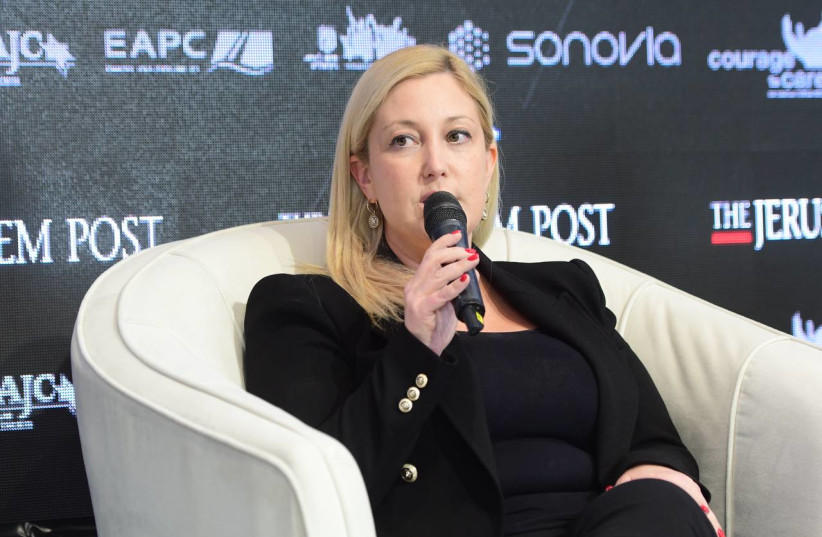PARIS – Realizing their potential for deep regional changes, the European Union is increasingly interested in the Abraham Accords, Blue and White Knesset member Ruth Wasserman Lande said Monday in Paris. As such, she called upon the EU to establish an inter-governmental body dedicated to promoting the accords and policies related to their implementation.
Wasserman Lande made her statement after participating in a conference in the French capital addressing the normalization agreements signed between Israel, the United Arab Emirates, Bahrain and Morocco. She was invited to participate as co-chair (together with Ofir Akunis of Likud) of the Knesset’s Abraham Accords Caucus.
Organized by Netanya Academic College francophone campus president Claude Grundman-Brightman in partnership with the European Leadership Network (ELNET), and hosted by the French Senate, Wasserman Lande was asked to speak at the conference twice. The MK stressed that the only way to defeat terrorism, war and instability in the region is to strengthen the Abraham Accords and enlarge the circle of countries participating in or supporting them.
“Europe should create a steering committee that shall oversee and assemble all activity and strategic thought on the issue of the Abraham Accords,” she said. “Europe must also create a pro-Abraham Accords caucus at the European Parliament, to liaise with its counterparts in the Knesset and the US Congress and Senate, as well as with our regional partners in the Emirates, Morocco and Bahrain.”
Speaking with The Jerusalem Post, Wasserman Lande said that “The European Union is increasingly interested in the Abraham Accords. We see it also in Israel. The European Union’s mission in Israel has reached out to us – to Ofir Akunis and myself – to be included in the different meetings we are holding. They want to be part of this process, to be involved. In fact, little by little, they are becoming an anchor for our activities, alongside the American Embassy.”

Wasserman Lande pointed out that France could become a leading force within Europe on the issue of the accords.
“The meeting yesterday in Paris was organized in partnership with the French senate,” she said. “This was no coincidence. The Europeans are starting to recognize the importance and the potential of the Abraham Accords - first of all for the stability of the Middle East, but also on other levels.
“One such level is the economic one. Another is food security, because of the war in Ukraine, of course. Then we have the issues of water and energy. These as well have become very relevant and important because of the war in Ukraine,” she said.
“It is important that the European Parliament sets up a body that would really get into the thick of things, a body that would comprehensively address all the aspects of the Abraham Accords and how Europe can fit in,” Wasserman Lande explained. “To start with, the European Union would do well to set up a lobbying group, a caucus like we did, as the American Congress and Senate did. The British Parliament also has an Abraham Accords group, with an active delegation.”
Beyond establishing a parliamentary lobbying group, she said that Europe needs something bigger.
“We are talking about so many countries, so I think that they should set up a special body that will coordinate policies, advance projects, help initiatives. The Abraham Accords have far-reaching strategic implications. Such a European body could help to create Middle East cooperation that would preserve regional stability, and this is critical not just for Israel, but globally.”
The Israeli Embassy in Paris, under the guidance of Ambassador Yael German, has been working in recent months to engage France over the accords and the strategic changes they are generating for the Middle East and beyond. As a result of these efforts, France currently realizes the global implications of the process that the Middle East is now going through. Diplomatic sources said the embassy considers this shift in perception from Paris as especially important, on both the European level and in the international arena.
Addressing the same conference in the Senate, German told its participants about the Mimouna celebration organized after Passover at her residence just last weekend, where the national anthems of both Israel and Morocco were played, and with both Jewish and Muslim guests dining and celebrating together. For her, it was a beautiful expression of the Abraham Accords spirit.
Similarly, Wasserman Lande sees special importance in bringing French leadership and newly reelected French President Emmanuel Macron into the Abraham Accords process.
“President Macron has a strong and friendly relationship with Foreign Minister Yair Lapid and with others in Israel’s leadership,” she said. “I do believe it would be beneficial for him to be involved in strengthening the Abraham Accords. After all, it’s an interest we all share. It is actually one of the rare issues that Israel’s coalition and opposition see eye-to-eye on.”
